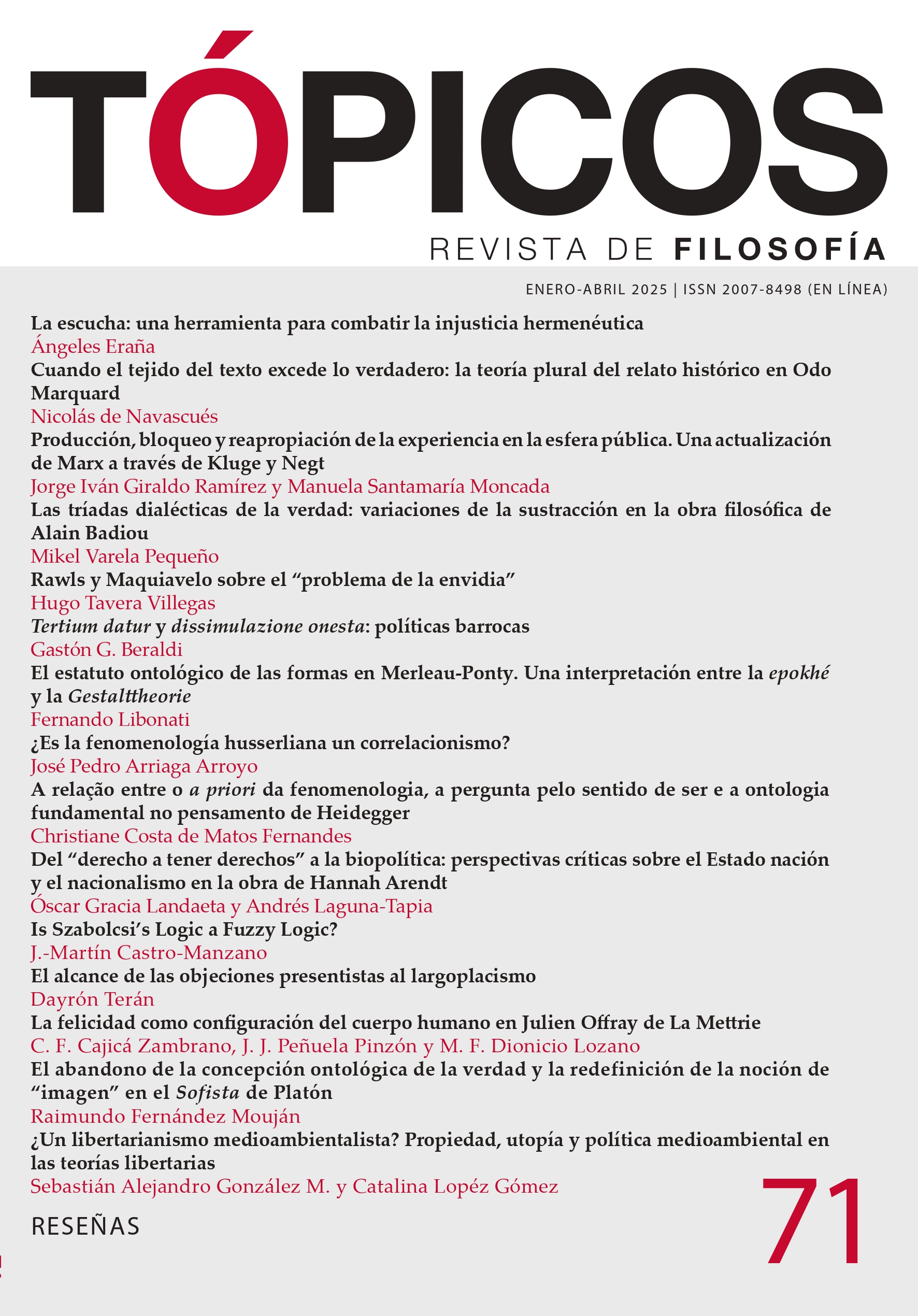Happiness as a Configuration of the Human Body in Julien Offray de la Mettrie
Published 2024-12-17
How to Cite
Copyright (c) 2024 Tópicos, Revista de Filosofía

This work is licensed under a Creative Commons Attribution-NonCommercial-NoDerivatives 4.0 International License.
Downloads
Altmetrics
Citas
Abstract
This paper traces the concept of happiness in the work of Julien Offray de La Mettrie Anti-Seneca or Discourse on Happiness (2010). Before exploring the term happiness, it is essential to answer the question: what does the French philosopher understand by being human? To fulfill this purpose, in the first chapter, the idea of the human body, understood as an organic machine, will be analyzed. In the second chapter, we will investigate the physical damage or diseases that can affect the machine or human body. In the third part, we will explore the concept of happiness, understood as carnal pleasure, voluptuousness and organic or arterial happiness. In the fourth chapter, the different ways to achieve a happy life will be examined. As a conclusion, it can be affirmed that happiness is, according to La Mettrie, the result of the organization or composition of the human body; therefore, the individual, when acting according to his nature, must be exempt from recrimination or ethical judgments.
References
- Cabanis, P. J. J. (1826). Relaciones de lo físico y moral del hombre. [Sin traductor]. Imprenta de J. Smith.
- Cordero, M. (2002). ¿No hay nada realmente justo? filosofía y política en el “Discurso préliminaire” del materialista La Mettrie. Éndoxa, 16, 221-234. DOI: https://doi.org/10.5944/endoxa.16.2002.5057.
- Cordero, M. (2001). Influencias modernas en el traité de l’âme De J. O. de La Mettrie. Contextos, 37-40, 263-282.
- De La Mettrie, J. O. (1962). El hombre máquina. A. Capelletti (trad.). EUDEBA.
- De La Mettrie, J. O. (1983). Tratado del alma. M. Gras Balaguer (trad.). Editora Nacional.
- De La Mettrie, J. O. (2010). Anti-Séneca o Discurso sobre la felicidad. D. Tatián (trad.). El cuenco de plata.
- De La Mettrie, J. O. (2015). La voluptuosidad. E. del Amo (trad.). Laetoli.
- Descartes, R. (2011). Tratado del hombre. A. Gómez Rabal (trad.). Gredos.
- Gras Balaguer, M. (1983). Introducción. En J. O. de La Mettrie, Tratado del alma. (pp. 8-42). Editora Nacional.
- Holbach, P. H. T. (1835). La moral universal o Los deberes del hombre fundados en su naturaleza. M. Diaz Moreno (trad.). Imprenta de los señores García y compañía.
- Holbach, P. H. T. (1982). Sistema de la naturaleza. N. Bacín (trad.). Editora Nacional.
- Luna Fabritius, A. (2011). El hombre máquina cartesiano. ¿Hacia una ciencia del hombre perfecto? Istor: Revista de Historia Internacional, 11(44), 57-66.
- Peñuela Pinzón, J. J. (2022). Análisis filosófico a la novela El retrato de Dorian Gray desde el concepto senequista y lamettriano de felicidad o vida vivible. [Tesis de licenciatura, Universidad Industrial de Santander]. Repositorio de la Universidad Industrial de Santander. URL: https://noesis.uis.edu.co/handle/20.500.14071/10165.
- Séneca, L. (1943). Sobre la felicidad. J. Marías (trad.). Alianza.
- Spector, C. (2016). Éloges de l’injustice. La philosophie face à la déraison. Éditions du Seuil.
- Thompson, A. (2014). French Eighteenth-Century Materialists and Natural Law. History of European Ideas, 42(2), 243-255. DOI: https://doi.org/10.1080/01916599.2014.950477.






